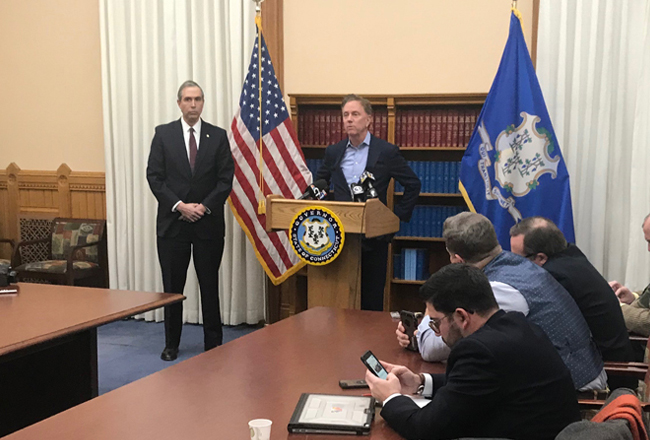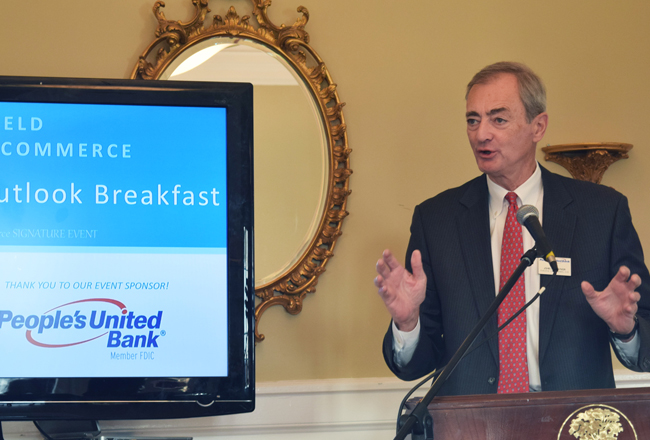With approximately 1,500 federal government employees in Connecticut either furloughed or working without paychecks, organizations in a number of sectors are offering a helping hand ”” led by banks.

the public-private partnership on Jan. 15.
“The banking industry is so good when it comes to events and crises like this,” said Webster Bank President and CEO John Ciulla. “Whether it”™s floods in North Carolina or a government shutdown, most banks have been open to working with people who are facing financial hardship through no fault of their own.”
Ciulla joined Gov. Ned Lamont at a Jan. 15 press conference to announce a public-private partnership between the state and private banks ”” led by Webster and supported by the Connecticut Bankers Association ”” that will enable essential federal workers who are required to report to work without pay, and do not qualify for unemployment insurance, to receive no-interest loans. Lamont is also encouraging municipalities to delay collecting property taxes from affected employees.
The Connecticut House of Representatives passed a bill on Jan. 22 by a vote of 127-15 and the Senate followed with a 32-1 vote of approval. Lamont immediately signed the legislation that will provide assistance to federal government workers who are not being paid.
Under the new law, participating financial institutions can make affected employees eligible for as many as three loans of up to $5,000 each, depending on the worker”™s monthly after-tax pay, less any unemployment compensation. As they are technically employed, the workers would normally not be eligible for state unemployment, but the new legislation allows them to collect those benefits.
The legislature”™s nonpartisan Office of Fiscal Analysis said that banks and credit unions would probably issue some $21.1 million in loans. The state will guarantee up to 10 percent of those loans, which must be interest-free for at least 270 days after the shutdown ends.
The bill also authorizes municipalities to establish a tax-deferment program for their impacted federal employees, which could include property taxes on land, buildings, motor vehicles as well as water and sewage treatment service assessments.
Lamont said that federal employees interested in the loans should contact their bank or credit union to determine whether it intends to participate in the program. If it is not, loans may also be available through a bank or credit union other than employees”™ usual financial institution.
Ciulla said Lamont had reached out to Webster Bank ”” based in Waterbury, but with several locations in Fairfield County including in Stamford, Norwalk, Greenwich, Fairfield, Shelton and Trumbull ”” and the CBA with the idea that “this should be done as quickly as possible. I think we started discussions around noon (on Jan. 15) and had the press conference at 5 that afternoon.”
Ciulla said there were “a number of other banks and credit unions in the process of agreeing” to the partnership, but deferred details until they were final. Nevertheless, Jack Barnes, chairman and CEO of People”™s United in Bridgeport, said his institution was one of the first to join the partnership.
“Personal and financial well-being is central to People”™s United”™s mission, which is especially important during times of hardship,” Barnes said, adding that “there are several avenues of relief,” including no-interest loans, that the bank can offer on a case-by-case basis.
A number of Fairfield County banks ”” including People”™s United, Union Savings Bank in Danbury and Newtown Savings Bank ”” have banners on their homepages encouraging affected federal workers who are customers to get in contact for help.
Newtown Savings President and CEO Kenneth Weinstein said his bank would judge each request for financial help on an individual basis. “It might be waiving certain fees where appropriate or extending payment deadlines ”” anything we can do to be reasonable under the circumstances,” he said.
“Our bigger concern is what will happen to the economy in general if the shutdown goes on for a long time,” Weinstein added.
At a Jan. 17 press conference, Danbury Mayor Mark Boughton and Union Savings Bank President and CEO Cynthia Merkle announced several relief initiatives for those affected by the shutdown. Those initiatives include conducting a food-donation drive at all USB branches, where they will accept nonperishable food donations through Feb. 16, as well as the waiving of monthly fees related to deposit accounts and the offer of interest-free loans to federal workers.
Part of that effort is in response to the fact that over 250 workers at the Federal Correctional Institution in the city are working without pay.
“We know that 78 percent of Americans work paycheck to paycheck,” Boughton said, “so we need to put money in the hands of our impacted community members who are having to choose between going to work and paying for utilities, mortgages or food for their families, as quickly as possible.”
One exception among the lenders is Stamford”™s Patriot Bank. President Richard Muskus Jr. said he and the bank are continuing to view the shutdown as “short-term ”” paychecks will be made retroactive.
“We”™re not talking about people being unemployed,” he continued. “These people have better jobs than many people I know, very secure jobs, and we fully expect them to be back to work sometime soon.”
Muskus allowed that, should the shutdown stretch into the next several weeks, Patriot would likely start to have conversations about providing personal loans to help affected customers meet their monthly bills.
“The situation is unfortunate,” he said. “It”™s to everyone”™s benefit to be resolved as quickly as possible.”
That includes small businesses, many of which are looking for Small Business Administration loans to start, maintain and/or grow their companies.
“The SBA is completely shut down,” Weinstein noted, “which hasn”™t gotten a lot of media attention yet. Funding for small-business loans is really important when it comes to supporting those businesses. We can make loans through the bank, but the programs that the SBA has can be particularly attractive.”
Muskus also expressed concern about the SBA shutdown, noting that Patriot has been actively growing its SBA-associated activities. “We”™ve got loans that have been approved or are in the process of being approved that are waiting for the SBA,” he said. “On day one (of reopening), the SBA had better be ready for a tidal wave of backlog.”
Newtown”™s Mark Lennon, a partner in that town”™s under-construction Asylum Brewing Co., said his group was one of those awaiting SBA approval. “We thought we”™d be pretty close to opening by now,” he said, “but this means that we won”™t be ready until several months after we get that approval.”
“A lot of people never anticipated this going beyond a few weeks,” Webster”™s Ciulla said. “We”™re just now starting to see the potential that the SBA shutdown could have on SBA-related loans. We will be coming up with a strategy to bridge those loans.”
Other groups are doing what they can to help those affected by the shutdown. Connecticut State Colleges and Universities President Mark Ojakian on Jan. 16 directed its schools ”” which include Norwalk Community College, Housatonic Community College in Bridgeport and Western Connecticut State University in Danbury ”” to temporarily suspend tuition payments for those impacted by the shutdown until it has ended.
Ojakian asked campus administrators to work with students to address the cost of books, transportation and other services.
Qualifying students must sign a document confirming they are financially impacted by the government shutdown and will continue making payments after its conclusion.
Members of the Coast Guard ”” who are not being paid during the shutdown ”” and their families can apply to Connecticut”™s Military Relief Fund for assistance. The fund provides payments of up to $5,000 to military families suffering financial hardship.
Utilities Connecticut Water as well as Eversource are also working on a case-by-case basis to possibly waive interest fees on overdue balances and work out revised payment schedules until the shutdown is over.




















